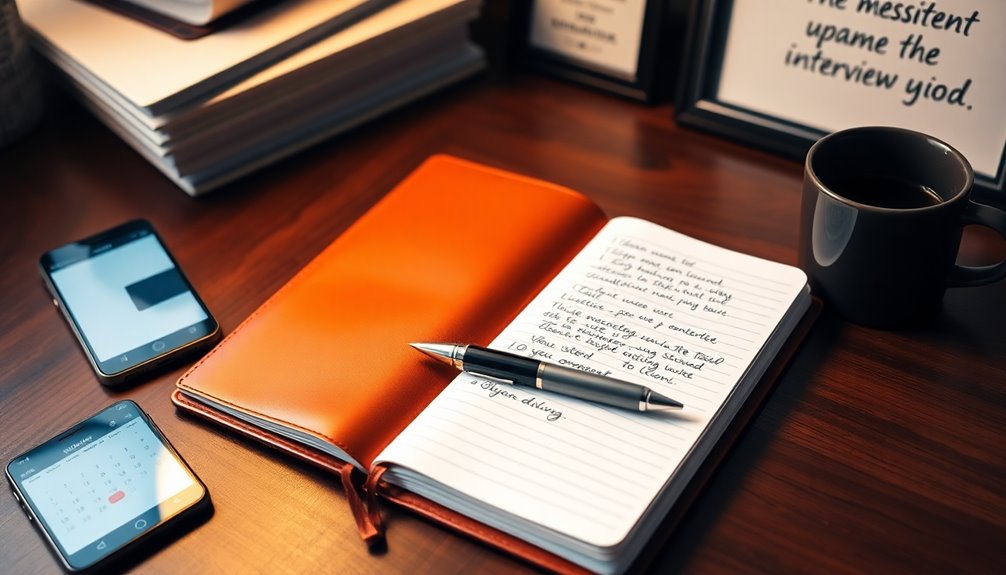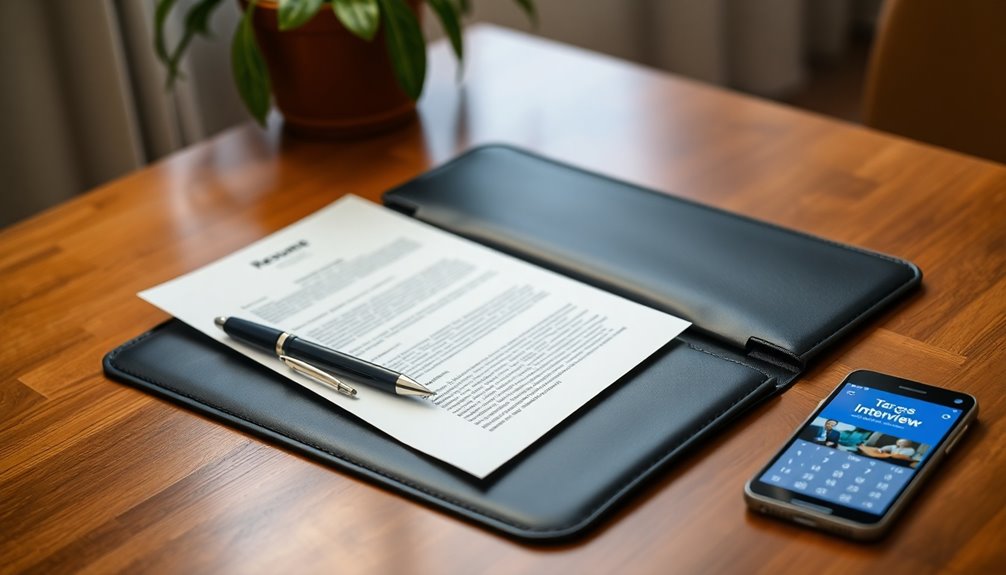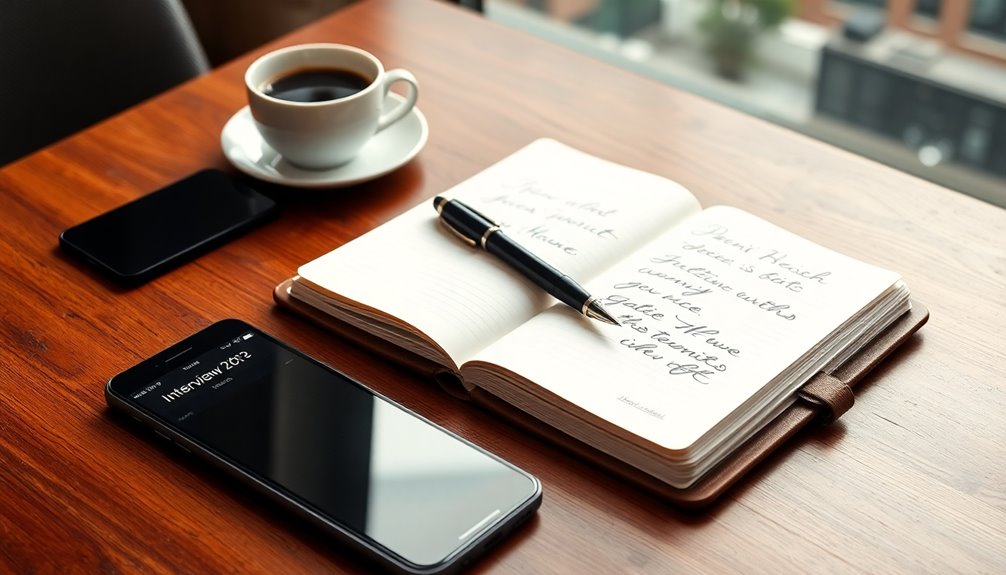Bringing notes to interviews is essential for demonstrating your preparedness and engagement. You'll want to prepare a list of questions to ask, key job details, and points on your qualifications. Organize your materials neatly in a folder or notebook for quick access. Don't forget to include your resume and any relevant documents like college transcripts. This shows professionalism and reliability. While it's great to have notes, avoid relying on them too much, as this can appear unprepared. If you keep going, you'll discover even more tips to guarantee your interview success.
Key Takeaways
- Bring a well-organized folder containing your resume, government ID, and college transcripts for easy access during the interview.
- Prepare a list of insightful questions to ask the interviewer, demonstrating your interest and engagement with the role.
- Include specific talking points about the company and job responsibilities to showcase your research and preparation.
- Jot down key qualifications and relevant achievements to facilitate structured discussions about your fit for the role.
- Ensure all materials are neatly organized, reflecting professionalism and enhancing your overall focus during the interview.
When to Bring Notes

Typically, you should bring notes to an interview to guarantee you're well-prepared and engaged. It's acceptable to have questions ready for your interviewer, showcasing your enthusiasm to learn more about the company.
When you come equipped with specific talking points, it highlights your research and preparation, making a strong impression. You should have questions about the job itself, too. This not only demonstrates your motivation but also helps clarify any details that mightn't have surfaced during your research.
Additionally, jotting down notes during the interview can enhance your engagement and facilitate structured discussions about your qualifications.
Types of Notes to Prepare

Having a well-organized set of notes can greatly enhance your interview experience. Start by preparing a list of questions for the interviewer, showing your enthusiasm and curiosity about the role.
Include specific talking points that relate to your research on the company, highlighting your initiative. You should also jot down key details about the job, like responsibilities and expectations, to demonstrate your understanding of the position.
Additionally, have notes on your qualifications, achievements, and relevant experiences ready to discuss. If applicable, prepare any industry-specific topics you want to touch on.
These notes not only help you stay focused but also signal your preparedness and genuine interest in the opportunity. Moreover, understanding the importance of establishing boundaries can help you navigate the dynamics of professional relationships during the interview process.
Organizing Your Materials

Before your interview, take the time to organize your materials to guarantee a smooth experience.
Start by gathering all necessary documents, like your resume, questions for the interviewer, and any notes you've prepared. Use a folder or notebook to keep everything neat and accessible.
Label sections clearly so you can quickly find what you need during the interview. Consider creating a checklist to make sure you have all essential items, such as extra copies of your resume and your ID.
This organization not only helps you stay focused but also demonstrates professionalism. Additionally, being prepared with a clear savings plan can help alleviate financial stress, allowing you to concentrate fully on your interview.
Essential Interview Documentation

When heading into an interview, bringing the right documentation is essential for showcasing your qualifications and professionalism. Key items include:
| Document Type | Purpose | Importance |
|---|---|---|
| Resume | Summarizes your work experience | Guarantees all interviewers have access |
| Government ID | Verifies your identity | Essential for security protocols |
| College Transcripts | Demonstrates academic achievements | Validates your educational background |
| List of Questions | Shows interest in the role | Engages the interviewer effectively |
Having these documents organized not only reflects your preparedness but also helps you confidently address any questions. Additionally, being well-documented can considerably enhance your impression during the interview, establishing your topical authority and credibility in the eyes of potential employers.
Boosting Confidence With Preparation

Preparing thoroughly for an interview can help you boost your confidence and set you up for success. When you gather your notes and organize your thoughts, you'll feel more in control.
Having key points about your experiences and achievements handy allows you to articulate your qualifications clearly. If you prepare questions to ask the interviewer, it shows your interest and helps you engage in meaningful conversation.
Additionally, organizing your materials, like resumes and transcripts, gives a professional impression and reduces anxiety. You'll walk into the interview knowing you've done your homework, which naturally enhances your confidence. Engaging in mental health resources can also provide additional support during this stressful time.
Avoiding Common Mistakes

Mistakes can undermine even the most prepared candidates during an interview. One major pitfall is failing to bring necessary documents like your resume or academic records, which can create an impression of disorganization.
Don't forget to prepare the company's contact information; not having it can lead to confusion. Neglecting personal hygiene might seem minor, but it can heavily impact first impressions.
Also, avoid relying too much on your notes; this can make you seem unprepared, especially in behavioral interviews where authenticity matters.
Finally, showing up without a clear plan or materials indicates a lack of seriousness about the opportunity.
Additional Tips for Success

To boost your chances of success in an interview, consider practicing your responses to common questions beforehand. This preparation can help you articulate your thoughts clearly and confidently.
Here are some additional tips to enhance your performance:
- Dress appropriately: Your appearance makes a strong first impression; choose professional attire that reflects the company culture.
- Listen actively: Pay attention to the interviewer's questions and comments; this shows respect and engagement.
- Be mindful of body language: Maintain eye contact and an open posture to convey confidence and enthusiasm.
- Follow up: Send a thank-you email post-interview to express appreciation and reiterate your interest in the position.
- Consider your financial goals: Understanding your long-term objectives can help you articulate how the position aligns with your career aspirations.
Implementing these strategies can greatly improve your interview experience and outcomes.
Frequently Asked Questions
Can I Bring My Laptop to Take Notes During the Interview?
You can bring your laptop to take notes during the interview, but it's important to contemplate the setting and the interviewer's preferences.
Some interviewers may prefer a more personal touch with pen and paper, while others might be fine with a laptop. Just make sure it doesn't distract you or make you seem disengaged.
Being prepared to jot down important points can show your interest and help you remember key details.
Should I Highlight Specific Points in My Notes?
Highlighting specific points in your notes can be a game-changer! It shows you're not just prepared, but laser-focused on what matters.
When you underline key details, it helps you stay on track during the interview and makes it easier to reference important talking points.
Plus, it demonstrates your enthusiasm and attention to detail, which can leave a lasting impression on your interviewer.
How Do I Decide What Questions to Ask the Interviewer?
To decide what questions to ask the interviewer, think about what matters most to you in a job.
Consider asking about company culture, team dynamics, or growth opportunities. You can also inquire about the day-to-day responsibilities of the role or what the interviewer enjoys about working there.
Tailoring your questions shows your genuine interest and helps you assess if the position aligns with your career goals and values.
Is It Acceptable to Refer to Notes While Answering Questions?
Yes, it's acceptable to refer to notes while answering questions during an interview. Doing so shows you're prepared and thoughtful about your responses.
Just make sure to glance at your notes rather than reading directly from them, which can seem disengaged. A well-placed reference can help you recall key points effectively, demonstrating your knowledge and enthusiasm for the position.
It's all about striking the right balance between preparation and genuine conversation.
What if I Forget My Notes on Interview Day?
Imagine showing up to a showdown with a blank slate instead of your trusty notepad.
If you forget your notes on interview day, don't panic. Rely on your preparation; your knowledge about the company and role will shine through.
Focus on articulating your skills and experiences confidently. You can always ask clarifying questions to buy time and demonstrate engagement.
Keep your cool—you've got this!
Conclusion
To summarize, bringing notes to your interview can be a game-changer. It shows you're prepared and engaged, making you a standout candidate. Just remember to keep it casual—think of your notes as a trusty sidekick rather than a crutch. With the right preparation and a confident approach, you'll be ready to knock their socks off. So go ahead, channel your inner superhero, and let your notes be your secret weapon for success!
Eugene brings a fresh, dynamic voice to our platform as one of our talented Writers. Specializing in research-driven content, he explores the latest findings in psychology and personal growth, translating them into actionable insights for our readers. Eugene’s work is fueled by a curiosity about what makes us tick and a desire to help others unlock their potential.










